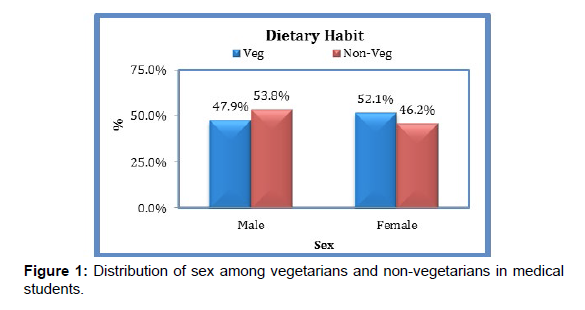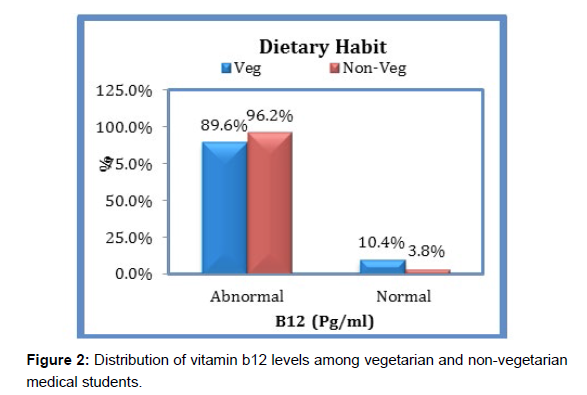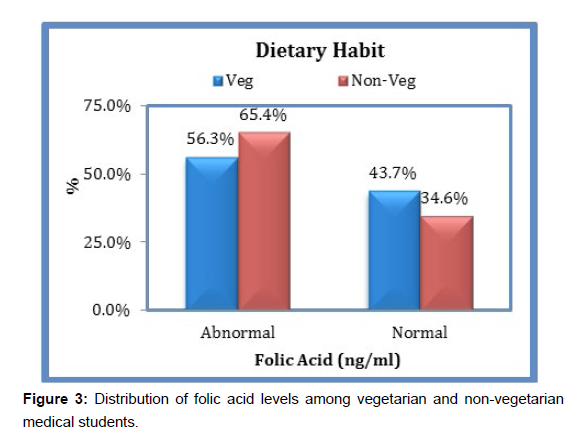Comparative Study of Vitamin B12 and Folic Acid Levels among Vegetarian and Non Vegetarian Medical Students
Received: 01-Apr-2023 / Manuscript No. bcp-23-92448 / Editor assigned: 03-Apr-2023 / PreQC No. bcp-23-92448(PQ) / Reviewed: 17-Apr-2023 / QC No. bcp-23-92448 / Revised: 21-Apr-2023 / Manuscript No. bcp-23-92448(R) / Accepted Date: 21-Apr-2023 / Published Date: 29-Apr-2023 DOI: 10.4172/2168-9652.1000410 QI No. / bcp-23-92448
Abstract
Introduction: Vitamin B12 and Folic acid (FA) deficiency is considered as a public health problem. The reasons for this condition are the varying dietary habits. The main reasons for vitamin B12 and FA deficiency are nutritional deficiencies. Vitamin B12 is also called as Cyanocobalamine. It is essential in enzymatic reactions like conversion of Homocysteine to Methionine and Methylmalonyl Co-A to SuccinylCo-A. Cobalamine deficiency results in accumulation of branched chain fatty acids in cell membranes. When accumulated in neurons, causes nerological manifestations. Folic Acid is also called as Vitamin B9, has a role in one carbon metabolism. Vegetarians and vegans must take special care to consume enough fortified food with Vitamin B12 and folic acid as it is mainly found in meat, egg and dairy products. Normal values of the Vitamin B12 are 180-900 pg/ml. Normal values of Folic acid are 5 - 20ng/ml. In this study we want to estimate and compare Vitamin B12 and folic acid levels among vegetarian and non-vegetarian medical students.
Materials and Method: The present Study was conducted after taking Ethical Committee approval. A written Consent form was obtained after explaining the procedure and the study protocol to each student. In this we have taken 48 vegetarian and 52 nonvegetarian’s medical students. The blood samples of the students were collected and vitamin B12 and FA levels were estimated in Beckman Coulter Auto analyzer AU480 and compared.
Inclusion Criteria: Students of age group 18-24.
Results: All the values obtained in the investigations done were entered in Microsoft Excel. Statistical analysis was done using SPSS (Statistical package for social science). 89.6% of vegetarians students vitamin B12 values are abnormal and 10.4% of vegetarian’s student’s vitamin B12 values are normal. 96.2% of non-vegetarians students vitamin B12 values are abnormal and 3.8% of nonvegetarian’s student’s vitamin B12 values are normal. 56.3% of vegetarian’s students FA values are abnormal and 43.8% of vegetarian’s students FA values are normal. 65.4% of non-vegetarians students FA values are abnormal and 34.6% of nonvegetarians students FA values are normal.
Conclusion: This study concludes that vegetarians and non-vegetarians are at risk of inadequacy of vitamin B12 and FA. This study does not support the idea that non vegetarians, because they consume animal products, are not at risk of developing a vitamin B12 deficiency.
Keywords: VitaminB12l; Folic acid
Keywords
VitaminB12l; Folic acid
Introduction
Nutritional status in medical students needs attention. Vitamins, as nutrients play a key role in maintaining the health of an individual and in preventing diseases. Vitamin B12 and Folic acid have been involved in cognitive and brain development. Vitamin B12 is also called as Cyanocobalamine. It is essential in enzymatic reactions like Homocysteine to Methionine and Methylmalonyl Co-A to Succinyl Co-A. Cobalamine deficiency results in accumulation of branched chain fatty acids in cell membranes, when accumulated in neuron causes nerological manifestation. Folic acid (FA) is also called as vitamin B 9 has a role in one carbon metabolism [1]. Vitamin B12 and FA play an essential role in a person’s health. Vegetarians and vegans must take particular care to consume enough Vitamin B12 and folic acid rich food as it is mainly found in meat, egg and dairy products.
• Normal values of Vitamin B12 are 180-900 pg/ml
• Normal Value of Folic acid is 5 - 20ng/ml [2]
Vitamin B12 and FA deficiency is considered to be a public health problem, their deficiency incidence and prevalence is not exactly known. The reasons for this vitamin deficient status are the varying dietary habits. The main reasons for vitamin B12 and FA deficiency are nutritional deficiencies that affect large sectors of the population including vegetarian mothers and their children who are affected during and after pregnancy, the elderly, frequent drug users as well as nutritional deficiency linked to people of low Socioeconomic status. The prevalence of vitamin B12 and FA deficiency was reported to be very high over the last decade. In Siddhartha Medical College, Vijayawada, comparison was done for levels of Vitamin B12 and FA collecting samples from 40 Vegetarians and 40 Non vegetarians and analyzed to infer the importance of these vitamins.
Materials and Method
The present study was conducted after taking approval from the institutional ethical committee. Consent form was taken from the participants after explaining the procedure and study protocol to each subject.
Study Design: Prospective observational study
Study location: Siddhartha Medical College, Vijayawada, A.P.
Study duration: 2 months from Sep’2022 and Oct’2022.
Sample size: 100 medical students.
Inclusion criteria: Students of age group 18-24 of both sexes.
Methodology
A detailed history of the students was taken and samples were collected from 48 vegetarians and 52 non-vegetarians. 3ml of venous blood was obtained in a vaccutianer without anticoagulant. The blood sample collected was allowed to clot and the sample was centrifuged at 3000rpm and the serum from the blood sample was separated. The separated serum was transferred to a sterile container to estimate in Beckman Coulter Auto analyser AU480. All the results obtained were entered in MS Excel. Statistical analysis was done using SPSS (Statistical package for social science).
Results
The study included 100 medical students and they were segregated as vegetarians and non-vegetarians in that 23 males and 25 females who are vegetarians(total 48) and 28 males and 24 females who are non-vegetarians(total 52) Vegetarians between18-20yrs are 56.3% and 21-24yrs are 43.8% and Non-vegetarians between 18-20yrs are 61.5% and 21-24yrs are 38.5% (Table 1) (Figure 1).
| Age | Frequency | Percent |
|---|---|---|
| 18-20 | 59 | 59% |
| 21-24 | 41 | 41% |
| Total | 100 | 100% |
Table 1: Distribution of age among medical students.
Comparisons of Vitamin B12
In vegetarians, minimum value of vitamin B12 is 86 and the maximum value is 214.In non-vegetarians, minimum value of vitamin B12 is 110 and the maximum is 192. 89.6% of vegetarians students have abnormal vitamin B12 values and 10.5% of vegetarian students have normal vitamin B12 values. 96.2% of non-vegetarians students have abnormal vitamin B12 values and 3.8% of nonvegetarian’s students have normal vitamin B12 values.
According to our study, in nonvegetarians the percentage of students having decreased vitamin B12 levels is more than the percentage of students having decreased vitamin B12 levels in vegetarians. Usually, when compared, the vegetarian population have much low concentrations of serum vitamin B12 than the nonvegetarian’s population (Table 2) (Figure 2).
B12 (Pg/ml) |
Veg | Non Veg | ||
|---|---|---|---|---|
| Count | % | Count | % | |
| Abnormal | 43 | 89.60% | 50 | 96.20% |
| Normal | 5 | 10.40% | 2 | 3.80% |
| Total | 48 | 100.00% | 52 | 100.00% |
| P=0.26 |
Table 2: Distribution of Vitamin b12 levels among vegetarian and non-vegetarian medical students.
Comparisons of Folic Acid
In vegetarians, minimum value of FA is 3.1 and the maximum value of is 13.4.In non-vegetarians, minimum value of FA is 3.1 and the maximum value is 23. 56.3% of vegetarians students have abnormal FA values and 43.8% of vegetarian students have normal FA values. 65.4% of non-vegetarians students have abnormal FA values and 34.6% of nonvegetarian’s students have normal FA values (Table 3) (Figure 3).
Folic Acid (ng/ml) |
Veg | Non-Veg | ||
|---|---|---|---|---|
| Count | % | Count | % | |
| Abnormal | 27 | 56.3% | 34 | 65.4% |
| Normal | 21 | 43.7% | 18 | 34.6% |
| Total | 48 | 100.0% | 52 | 100.0% |
| P=0.41 | ||||
Table 3: Distribution of Folic acid levels among vegetarian and non-vegetarian medical students.
According to our study, in nonvegetarians, the percentage of students having decreased folic acid levels is more than the percentage of students having decreased folic acid levels in vegetarians
Discussion
The results from our present study showed that abnormalities in the vitaminB12 values in the non-vegetarians are greater than the abnormalities in the vitaminB12 values in vegetarians. The individuals who are consuming vegetarian or vegan diets might have low risk of cardiovascular issues but there may be a high risk of developing nutritional deficiencies, leading to the exclusion of meat and fish in vegetarians, and all animal products in vegans.
VitaminB12 which is a naturally occurring vitamin present usually in foods of animal origin, and the vegetarian people who do not take sufficient quantities of foods fortified with the vitamin B12 like fortified breakfast cereals, fortified milks which are obtained from plant based products, fortified soy products and yeast extract, or do not regularly consume vitamin B12 supplements, will have very high risk of developing vitamin B12 deficiency.
Results from many previous studies proved that the vegetarian people are having lower average serum concentrations of the vitamin B12 in comparison to the non-vegetarian people [3] but some studies showed that there is no change in the serum vitaminB12 levels among the vegetarian people when compared to the people who are nonvegetarians [4]. Many previous studies have concluded that in the people consuming mixed diet suggests that the serum vitamin B12 concentrations are low in the older individuals as the vitamin B12 which is bound to protein is less in the elderly people[5] consequently causing vitamin B12 deficiency in older population. It is not completely known to what extent the length of adherence to the vegetarian diet is linked with serum concentrations of vitamin B12.
Vitamin B12 is difficult to be made available from Vegetarian dietary sources in recommended daily intake. As many studies have highlighted that the deficiency of Vitamin B12 is known to be significantly prevalent amongst vegetarian population. In contrary our study showed, the vitamin B12 deficiency values amongst subjects taking the vegetarian diet and the non-vegetarian diet. Among the subjects consuming non vegetarian foods, the vitamin B12 deficiency was also present. According to the National Institute of Nutrition, Hyderabad, the amount of the vitamin B12 present in 100 g of edible portion in liver of goat, sheep is 91 mg, in the egg yolk (hen) is 4.4 mg, in the shrimp is 9 mg, in mrigal fish is 1.4 mg, in cow milk is 0.14 mg, in cow milk curd is 0.13 mg, and in skimmed milk powder is 0.3 mg [6]. The Vitamin B12 content of the meat is usually high but there is low bioavailability. There is increase in the prevalence of the vitamin B12 deficiency in non-vegetarian subject and the possible reason may be due to low frequency of consumption of non-vegetarian food or malabsorption amongst non-vegetarian group. A study done in South India showed increase in the prevalence of the vitamin B12 deficiency in non-vegetarians, especially in males [7] which is similar to our study where non vegetarian subjects had vitamin B12 deficiency.
Those who do take non vegetarian food may be deficient in vitamin B12 due to variety of factors such as inadequate intake, more intake of poultry, consuming fried foods or iatrogenic factors such as medicines causing vitamin B12 depletion. It was also studied that the fried food has nearly 32% less content of cobalamins than in raw meat [8]. The results obtained from our present study do not support the idea that non vegetarians do not have the Vitamin B12 deficiency, because they consume animal products.
The better vitamin B12 levels of vegetarians when compared to nonvegetarians can be mainly due to their intake of milk and milk products. The vitamin B12 content in milk is lesser, but the bioavailability of the vitamin B12 in milk is greater [9].
Folic acid, a hematopoietic water soluble vitamin, is rich in green leafy vegetables, pulses. Deficiency of FA manifests as macrocytic anaemia and hyperhomocysteinemia. Many studies conclude that non vegetarians are more deficient in folic acid due to less consumption of food rich in folic acid and vegetarians have adequate to high folic acid levels. A Study in Buddhist vegetarians concluded adequate serum folic acid status [10] . Our study contradicts the statement of vegetarians having adequate folic acid as 56.3% of vegetarians in this study had deficient folic acid levels. This study agrees that people taking non vegetarian diet are at risk of developing folic acid deficiency as 65.4% of non-vegetarians had less folic acid levels.
Conclusion
The final conclusion drawn from our present study is that we does not support the idea that non vegetarian diet taking people, because they include animal products in their diet , are not at risk of developing the vitamin B12 deficiency and vegetarians consuming leafy vegetables are not at risk of developing folic acid deficiency. Further, research in to the health effects of vitamin B12 deficiency and depletion in people with vegetarians intake and non-vegetarian intake should make sure that regular consumption of sufficient vitamin B12 and folic acid from fortified foods and/or supplements.
Limitations of our present study
• The sample size could have been more to correlate and compare.
• Diet history could be included.
• The age group of the subjects can be increased for more accurate results
• Intrinsic factor studies have been included in the study which supports vitamin B12 results and comparisons.
• Need to rule out malabsorption.
References
- Lippincott Illustrated Reviews: Biochemistry 7th Edition .
- D M Vasudevan (2010) Text book of Biochemistry for medical students – 9th Edition.
- Krajcovicová-Kudlácková M, Blazícek P, Kopcová J, Béderová A, Babinská K(2000) Homocysteine levels in vegetarians versus omnivores. Ann Nutr Metab 44: 135-138.
- Herrmann W, Schorr H, Purschwitz K, Rassoul F, Richter V(2001) Total homocysteine, vitamin B(12), and total antioxidant status in vegetarians. Clin Chem 47: 1094-1101.
- Baik HW, Russell RM (1999) Vitamin B12 deficiency in the elderly. Annu Rev Nutr 19: 357-377.
- Dietary Guidelines for Indians - A Manual (2003)National Institute of Nutrition. Indian Council of Medical Research. Hyderabad.
- Ramesh V, Ashokan S, Sengottaiyan A(2020) Profile of vitamin B12 deficiency and analysis of contributory factors among inpatients in a tertiary care hospital in Madurai, south India. J Evid Based Med Healthc 7: 2674-2679.
- Czerwonka M, Szterk A, Waszkiewicz-Robak B (2014) Vitamin B12 content in raw and cooked beef. Meat Sci 96: 1371-1375.
- Matte JJ, Britten M, Girard CL (2014) The importance of milk as a source of vitamin B12 for human nutrition. Animal Frontiers 4: 32–37.
- Lee Y, Krawinkel M (2011) The nutritional status of iron, folate, and vitamin B-12 of Buddhist vegetarians. Asia Pac J Clin Nutr 20: 42-49.
Indexed at, Google Scholar, Crossref
Indexed at, Google Scholar, Crossref
Indexed at, Google Scholar, Crossref
Indexed at, Google Scholar, Crossref
Indexed at, Google Scholar, Crossref
Indexed at, Google Scholar, Crossref
Citation: Srivani S, Nutakki S, Chowdeswari N, Swathi V, Sreya (2023)Comparative Study of Vitamin B12 and Folic Acid Levels among Vegetarian andNon Vegetarian Medical Students. Biochem Physiol 12: 410. DOI: 10.4172/2168-9652.1000410
Copyright: © 2023 Srivani S, et al. This is an open-access article distributed underthe terms of the Creative Commons Attribution License, which permits unrestricteduse, distribution, and reproduction in any medium, provided the original author andsource are credited.
Share This Article
Recommended Journals
Open Access Journals
Article Tools
Article Usage
- Total views: 1312
- [From(publication date): 0-2023 - Dec 22, 2024]
- Breakdown by view type
- HTML page views: 1223
- PDF downloads: 89



